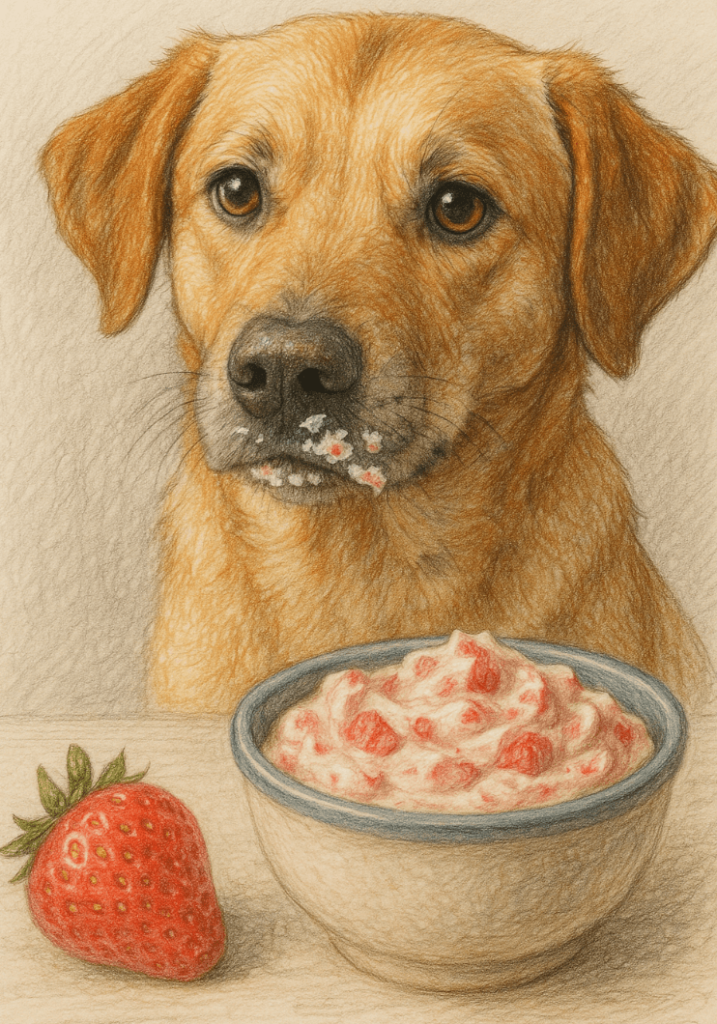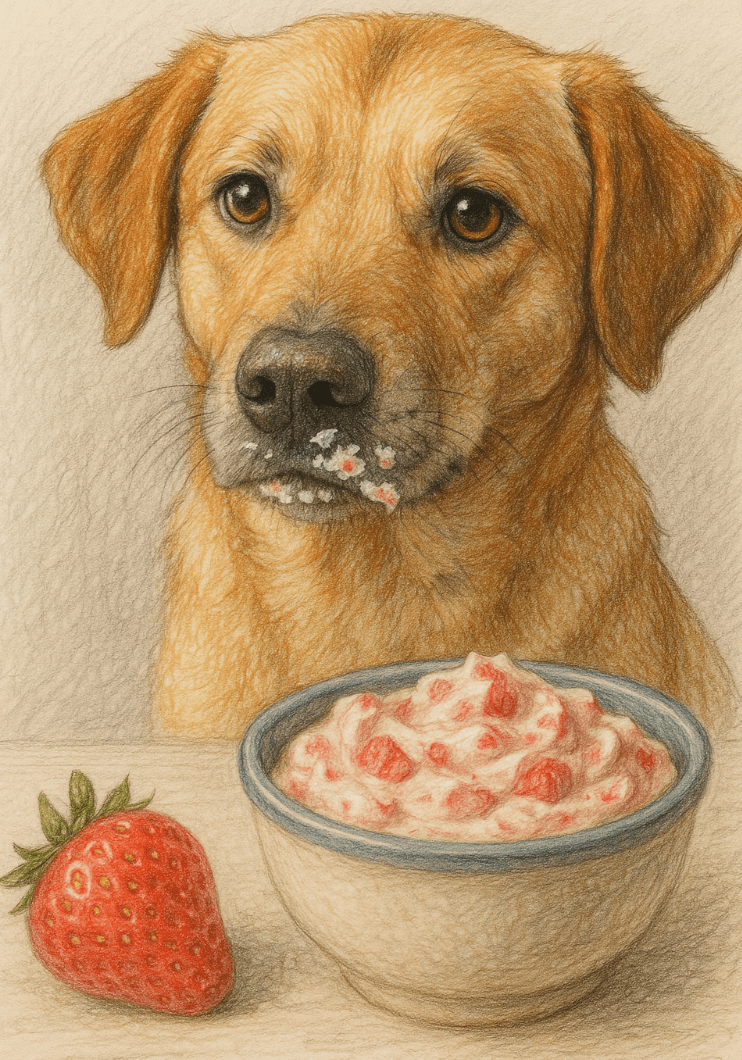Can Dogs Eat Strawberry Cream Cheese?
When it comes to sharing human food with our furry friends, it’s essential to tread carefully. While dogs are often eager to sample what’s on our plates, not all foods are safe for them to consume. Strawberry cream cheese, a popular sweet treat for humans, may seem harmless at first glance, but is it really safe for dogs? This blog post dives into the details, exploring whether strawberry cream cheese is a suitable snack for your canine companion. We’ll examine the ingredients, potential risks, and safer alternatives to ensure your dog stays happy and healthy while enjoying occasional treats.
Key Ingredients in Strawberry Cream Cheese and Their Effects on Dogs
Understanding the components of strawberry cream cheese is crucial to determining its safety for dogs. Here’s a breakdown of the main ingredients and how they might affect your pet.
Strawberries:
Strawberries are non-toxic to dogs and can even provide vitamins like C and K, as well as fiber. However, they should be given in moderation due to their natural sugar content.Cream Cheese Base:
Plain cream cheese is generally safe for dogs in small amounts, but it’s high in fat, which can upset their stomachs or lead to weight gain over time.Added Sugars:
Many flavored cream cheeses contain added sugars, which are unhealthy for dogs and can contribute to obesity, diabetes, or dental issues.Artificial Flavors and Colors:
These additives are unnecessary for dogs and may cause digestive upset or allergic reactions in sensitive pups.Preservatives:
Some preservatives used in processed foods can be harmful to dogs, so it’s best to avoid products containing unfamiliar chemicals.
While some ingredients are less harmful than others, the combination found in strawberry cream cheese makes it less than ideal for regular consumption by dogs.
Potential Risks of Feeding Strawberry Cream Cheese to Dogs
Feeding your dog strawberry cream cheese occasionally may seem harmless, but there are several risks associated with this indulgence. Being aware of these dangers will help you make informed decisions about your dog’s diet.
Digestive Upset:
The high fat and sugar content in cream cheese can cause diarrhea, vomiting, or pancreatitis in dogs, especially if consumed in large quantities.Weight Gain:
Regularly feeding calorie-dense treats like cream cheese can lead to unhealthy weight gain, increasing the risk of joint problems and other health issues.Allergic Reactions:
Some dogs may have sensitivities to dairy or artificial ingredients, resulting in itching, swelling, or gastrointestinal distress.Tooth Decay:
Sugary foods contribute to plaque buildup and cavities, compromising your dog’s dental health over time.Nutritional Imbalance:
Treats like strawberry cream cheese lack essential nutrients and can displace healthier options in your dog’s diet if overfed.
These risks highlight why it’s important to limit or avoid giving your dog strawberry cream cheese altogether.
Check this guide 👉Can Dogs Eat Radicchio? Best 7 Expert Tips!
Check this guide 👉Can Dogs Eat Grapeseed Oil? Best 7 Expert Tips!
Check this guide 👉Can Dogs Eat Cow Hooves? Best 7 Expert Tips!

Safe Alternatives to Strawberry Cream Cheese | Foods to Avoid Giving Your Dog |
|---|---|
Plain, unsweetened yogurt | Chocolate |
Fresh strawberries (in moderation) | Grapes and raisins |
Peanut butter (xylitol-free) | Onions and garlic |
Cottage cheese (low-fat, plain) | Macadamia nuts |
Homemade dog-safe fruit purees | Artificially sweetened snacks |
How to Safely Introduce New Foods to Your Dog
If you’re considering offering your dog a new food, including strawberry cream cheese, it’s important to do so cautiously. Follow these guidelines to minimize risks and ensure your dog’s safety.
Start with Small Portions:
Offer just a tiny taste to see how your dog reacts before giving larger amounts.Monitor for Adverse Reactions:
Watch for signs of digestive upset, allergies, or discomfort after introducing new foods.Choose High-Quality Ingredients:
Opt for minimally processed, natural foods whenever possible to reduce exposure to harmful additives.Consult Your Veterinarian:
Always seek professional advice before introducing unfamiliar foods, especially if your dog has pre-existing health conditions.Limit Treats to 10% of Daily Calories:
Ensure treats don’t exceed 10% of your dog’s daily caloric intake to maintain a balanced diet.
By following these steps, you can safely experiment with new foods without compromising your dog’s health.
Signs Your Dog May Have Eaten Something Harmful
Even with precautions, accidents can happen. Knowing the signs of toxicity or digestive issues will help you act quickly if your dog ingests something harmful.
Vomiting or Diarrhea:
These symptoms often indicate digestive distress caused by inappropriate foods or toxins.Lethargy or Weakness:
A sudden lack of energy could signal poisoning or an adverse reaction to certain ingredients.Excessive Drooling:
Unusual drooling may occur if your dog has consumed something irritating or toxic.Loss of Appetite:
Refusing meals is a red flag that something might be wrong with your dog’s digestion or overall health.Difficulty Breathing:
Labored breathing can indicate a severe allergic reaction or ingestion of dangerous substances.
Recognizing these signs early allows you to seek veterinary care promptly, preventing further complications.
Common Mistakes Pet Owners Make When Feeding Human Food
Sharing human food with pets can be tempting, but certain mistakes can put your dog’s health at risk. Avoiding these pitfalls ensures your dog stays safe and healthy.
Assuming All Fruits Are Safe:
Not all fruits are dog-friendly; grapes, cherries, and citrus fruits can be toxic or harmful.Ignoring Portion Sizes:
Even safe foods can cause problems if fed in excessive amounts, leading to obesity or nutrient imbalances.Overlooking Ingredient Labels:
Processed foods often contain hidden dangers like xylitol, which is highly toxic to dogs.Feeding Leftovers Without Research:
Many table scraps include spices, oils, or seasonings that aren’t suitable for dogs.Neglecting Individual Sensitivities:
Every dog is different—what’s fine for one may trigger allergies or intolerance in another.
Avoiding these mistakes helps protect your dog from preventable health issues.
Benefits of Offering Dog-Safe Treats Instead
Choosing dog-safe treats over human snacks provides numerous benefits for your furry friend. Here’s why opting for specially formulated or homemade dog treats is a smarter choice.
Tailored Nutrition:
Dog-safe treats are designed to meet your pet’s dietary needs without unnecessary additives.Reduced Risk of Toxicity:
These treats eliminate the worry of accidentally feeding something harmful.Improved Dental Health:
Many dog treats are formulated to clean teeth and freshen breath, promoting better oral hygiene.Enhanced Digestion:
Easily digestible ingredients reduce the likelihood of stomach upset or irritation.Customizable Options:
You can choose treats based on your dog’s size, age, activity level, or specific health requirements.
Switching to dog-safe treats ensures your pet gets the nutrition they need while staying safe and satisfied.
Fun Ways to Treat Your Dog Without Strawberry Cream Cheese
There are countless creative ways to reward your dog without resorting to potentially risky human foods. These ideas keep treat time exciting and nutritious.
Freeze Fresh Fruit Cubes:
Blend strawberries or blueberries with water and freeze them for a refreshing, low-calorie snack.Stuff a Kong Toy:
Fill a Kong toy with peanut butter, yogurt, and kibble for a mentally stimulating treat puzzle.Bake Homemade Biscuits:
Whip up batches of dog-friendly biscuits using ingredients like pumpkin, oats, and eggs.Try Dehydrated Meat Snacks:
Dehydrate chicken, turkey, or beef slices for a protein-packed, chewy treat.Offer Chilled Veggies:
Frozen green beans or carrot sticks make crunchy, hydrating snacks perfect for hot days.
These alternatives provide variety and excitement while keeping your dog’s health a top priority.
Frequently Asked Questions About Dogs and Strawberry Cream Cheese
Is plain cream cheese safe for dogs?
Yes, in small amounts, plain cream cheese is generally safe, but it’s high in fat and should be given sparingly.
Can dogs eat fresh strawberries?
Yes, fresh strawberries are safe and nutritious for dogs when served in moderation.
What should I do if my dog eats strawberry cream cheese?
Monitor your dog for any adverse reactions. If they show signs of illness, contact your veterinarian immediately.
Are artificial flavors harmful to dogs?
While not always toxic, artificial flavors can irritate your dog’s digestive system and should be avoided.
How can I make dog-safe treats at home?
Use simple, natural ingredients like peanut butter, oats, and bananas to create healthy, homemade snacks.
Prioritizing Your Dog’s Health When It Comes to Treats
While strawberry cream cheese might tempt us to share a bite with our four-legged friends, it’s clear that this particular treat isn’t the best choice for dogs. Between its high sugar content, artificial additives, and potential to cause digestive upset, there are plenty of reasons to explore safer alternatives. By understanding what foods are truly safe for dogs and how to introduce new items responsibly, you can ensure your pup enjoys delicious treats without compromising their health. Remember, moderation and mindfulness are key—your dog’s wagging tail and good health will thank you!
Do Cats Have Taste Buds? Best 7 Expert Tips! – Discover how cats experience flavors and why their taste is so unique.
Do Dogs Have Taste Buds? Best 7 Expert Tips! – Discover how dogs experience taste, their preferences, and what it means for their diet and health.
Can Cats Taste Sweet? Best 7 Expert Tips! – Discover why cats can’t taste sweetness, how it affects their diet, and tips to keep them healthy and happy.
Can Dogs Taste Sweet? Best 7 Expert Tips! – Discover how dogs perceive sweetness, which foods are safe, and tips to manage their sweet cravings responsibly.





